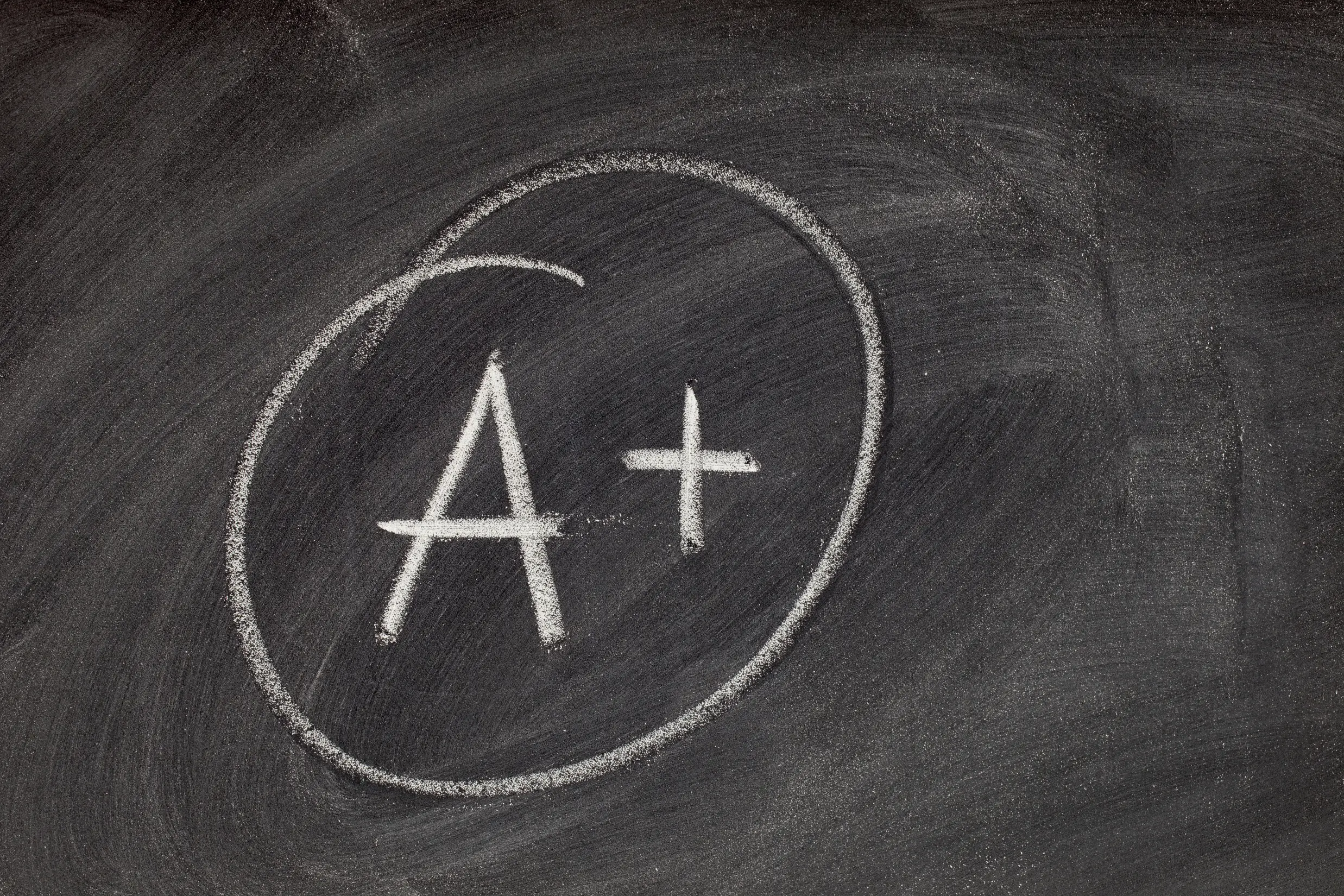1. What is GPA?
GPA is a numeric indicator of your academic performance in high school. In short, your GPA is the average of all your grades, which you use when you apply to high school, college, and graduate school.
The 4.0 high school GPA scale is the most popular in the U.S. In this scale, your letter grade and letter grade are converted to a 4.0 scale, with a GPA ranging from 0.0 at the bottom to 4.0 at the top. However, some schools may use the 5.0 or 4.5 scales; their uses will be explained later in this article.
CollegeBoard has provided a conversion chart from letter grade (A+ to F) and percent grade (100 to below 65) to a number on the 4.0 GPA scale:
| Letter Grade | Percent Grade | 4.0 Scale |
|---|---|---|
| A+ | 97-100 | 4.0 |
| A | 93-96 | 4.0 |
| A- | 90-92 | 3.7 |
| B+ | 87-89 | 3.3 |
| B | 83-86 | 3.0 |
| B- | 80-82 | 2.7 |
| C+ | 77-79 | 2.3 |
| C | 73-76 | 2.0 |
| C- | 70-72 | 1.7 |
| D+ | 67-69 | 1.3 |
| D | 65-66 | 1.0 |
| E/F | Below 65 | 0.0 |
2. Weighted vs. Unweighted GPA
Especially if you’re taking honors or AP courses, you may have heard the weighted and unweighted in reference to your high school GPA. Traditionally, schools have used the 4.0 scale to measure your unweighted GPA. Your unweighted GPA is your pure grade point average on the 4.0 scale without any consideration for the difficulty levels of the courses you’re taking. College officers will typically convert your GPA to the standard 4.0 scale for easier comparison, despite the various other scaling systems. However, they will still consider the difficulty level of each course you took in high school while evaluating your application. So, the more AP and advanced courses with high scores you have, the better your application will turn out to the admissions committee.
For unweighted GPAs, the difficulty of the courses you take is not considered. If you take all advanced classes and earn B+, your average GPA will be 3.3. However, if your friend decides to take easier courses and earns As in all of them, their average GPA will be 4.0. Regardless of the course difficulty, students’ unweighted GPAs are measured on the same scale. To calculate the unweighted GPA, students only have to:
- Translate the letter grade of the GPA scale (D=1.0, etc.). You can refer to the table above for GPA conversion
- Calculate the sum of all the 4.0 scale grades
- Divide that number by the total number of classes you took
A good unweighted GPA depends on your personal perspectives, and the kind of colleges you are planning to apply to. For Ivy League colleges, students are expected to have at least a 3.8 GPA+, which means you have to score mostly in the range of A- to A+. UC Berkeley is one of the top prestigious universities on the West Coast, and the average unweighted GPA of freshmen is 3.86-4.00. If you happen to have a couple of Bs, B+s or B-s but still want to get a 3.8+ GPA, you’ll have to get As in the rest of your classes.
The weighted high school GPA was invented to reflect students’ GPAs while taking into consideration the difficulty of the courses they are enrolled in. Your weighted GPA reflects your academic performance on a larger scale to give you more credit for getting good grades in higher level classes. The scale that high schools use to measure weighted GPA isn’t standardized like the unweighted GPA; so many schools use different numbers, though the most common are 4.5 and 5.0, with 5.0 being the highest across the American education system. To best calculate your GPA, you should ask your high school counselor or registrar for the grade conversion table used by your school. Here is an example of a GPA conversion:
| Letter Grade | Percent Grade | AP Grade |
|---|---|---|
| A+ | 4.5 | 5.0 |
| A | 4.5 | 5.0 |
| A- | 4.2 | 4.7 |
| B+ | 3.8 | 4.3 |
| B | 2.5 | 4.0 |
| B- | 3.2 | 3.7 |
| C+ | 2.8 | 3.3 |
| C | 2.5 | 3.0 |
| C- | 2.2 | 2.7 |
| D+ | 1.8 | 2.3 |
| D | 1.5 | 2.0 |
| E/F | 0 | 0 |
3. Semester GPA vs. Cumulative GPA
The difference between your Semester GPA and Cumulative GPA are easier concepts to understand. Your semester GPA is a measure of how well you did in each individual semester, while your cumulative GPA is an overall measure of all of your academic performance over time.
Semester GPA is your grade point average throughout one semester. You can calculate it by converting the grades that you earned for each class in a specific semester on the appropriate scale, and dividing that sum by the total number of classes you took that semester. For example, if you take 4 classes in the Fall semester and get all Bs, your semester GPA is 3.0. This GPA will give you an idea of how well you did during the most recent term.
Compared to Semester GPA, Cumulative GPA is more important for things like college applications, as it represents your grade point average based on every class that you’ve taken since starting high school. This GPA can vary from semester to semester as you take more classes and build up your academic record. For example, if you have attended high school for 2 years, your cumulative grade point average will be the average of 4 semesters. You can calculate cumulative GPA by converting the grades you received at the end of each semester for every class you’ve taken so far, adding them up, and then dividing by the total number of classes. It’s important to consider both the Semester GPA and Cumulative GPA in order to get a more accurate picture of your academic performance. By understanding the differences between these two GPAs, you’ll be better equipped to make informed decisions about your educational progress.
4. Class Rank
Your high school uses your GPA scores to measure your academic performance in comparison to all of the other students in your grade. This comparison is used to determine each student’s class rank. Typically, class rank is reevaluated every semester or trimester, depending on which system your school follows.
Your class rank can be based on either your unweighted or weighted GPA, or both. This rank will also appear on your official transcript for college applications. So, for example, if your junior class has 500 students, and you’re ranked 100, your school may list 100th, 80th percentile, or top 20% of your class on your documents. 80th percentile means that 80% of the class scored lower than you, but 20% of the class scored higher than you.
The class ranking system helps admission officers have a more detailed context about your performance in school, and your academic ability outside of GPA alone. A good GPA score and class rank also give you access to several specialized scholarship opportunities, and even recognition as valedictorian (if you rank #1 in the class).
GPA, Semester GPA, and Cumulative high school GPA are all critical metrics for measuring academic performance in high school. However, when it comes to college admissions or scholarship applications, class rank is also a key factor that can help you stand out from the crowd. While GPA alone may not be enough to get into your dream college or earn specific scholarships, having an impressive class rank will significantly increase your chances of success. Therefore, if you want to excel academically and make sure your hard work pays off, keep track of your GPA and class rank throughout high school to achieve your educational goals.










